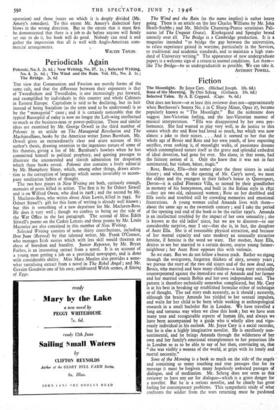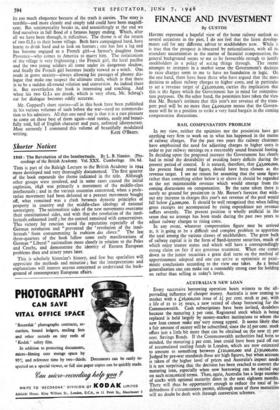Fiction
ONE does not know—or at least this reviewer does not—approximately when Beethoven's Sonata No. 2 in C Sharp Minor, Opus 27, became popularly known as " The Moonlight." But the nickname does suggest late-Victorian feeling, and the late-Victorian manner of musical interpretation. " Ella was disappointed by her own per- formance. She had wanted to play very well, to do justice to this sonata which she and Rose had loved so much,, but which was now almost a joke to their nieces. . . . And it seemed to her that the whole age of Bessie and Rose and her own youth, of love expecting sacrifice, even seeking it, of moonlight walks, of passionate dreams which contemplated nature itself as the grave and splendid cathedral of ideal devotion, had gone for ever. She alone, in that room, had the faintest notion of it. Only she knew that it was not in fact sentimental, but violent, bitter, tragic."
Rose, Bessie, Ella—their names place the three sisters in social history ; and when, at the opening of Mr. Cary's novel, we meet the eldest and the youngest in their father's house in Queensport, Devon—it is called Florence Villa, so named by their grandfather in memory of his honeymoon, and built in the Italian style in 1832 —they are two old, exhausted women ; Rose on her deathbed and Ella senile and troubled still by crowding memories and emotional frustrations. A young woman called Amanda lives with them— about the same age as the twentieth century ; and I take the period of the opening and end of the book to be the earlier 1930's. Amanda is an intellectual troubled by the impact of her own sensuality ; she is known as the old ladies' niece, but we are to discover—to our considerable surprise, may I say—that she is, in fact, the daughter of Aunt Ella. She is of reasonable physical attraction, and because of her mental capacity and sane modesty an unusually attractive heroine, if heroine is the word we want. Her mother, Aunt Ella, desires to see her married to a certain decent, coarse young farmer- neighbour ; her Aunt Rose opposes this with violence.
So we start. But we do not follow a beaten track. Rather we zigzag through the overgrown, forgotten thickets of sixty, seventy years ; we pursue the story of the two old sisters and of the now dead one, Bessie, who married.and bore many children—a long story erratically counterpointed against the immediate one of Amanda and her farmer and her married cousin Robin and her own independent soul. The pattern is therefore technically somewhat complicated, but Mr. Cary is at his best in breaking up established formulae either of technique or of thought. The sad story ends austerely, as it should ; austerely, although the brainy Amanda has yielded to her sensual impulses, and waits for her child to be born while working at anthropological, research in a small bachelor flat in London. We have travelled a long and tortuous way when we close this book ; but we have seen many true and recognisable aspects of human life, and always we have been accompanied by a guide who is wholly alive and vigo- rously individual in his outlook. Mr. Joyce Cary is a social recorder, but he is also a highly imaginative novelist. He is excellently non- sentimental, and he brings Amanda through the wilderness of her own and her family's emotional entanglements to her penurious life in London so as to be able to say of her then, convincing us, that " she was visibly aVeLmnan of the world, at grips with its lonely and mortal necessity."
Sons of the Morning is a book so much on the side of the angels and containing so many touching and true passages that for its message it must be forgiven many hopelessly awkward passages of dialogue, and of meditation. Mr. Schrag does not seem to this reviewer to have any ear for dialogue—which is a grave danger for a novelist. But he is a serious novelist, and he clearly has great feeling for contemporary problems. This sympathetic study of what confronts the soldier from the wars returning must be pardoned
its too much eloquence because of the truth it carries. The story is terrible—and more cleanly and simply told could have been magnifi- cent. But sentimentality breaks in, and astonishingly at the end we find ourselves in full flood of a fatuous happy ending. Which, after all we have been through, is ridiculous. The theme is of the return of two G.I.s to their home village. Both have campaigned hard, have learnt to drink hard and to look on horrors ; one has lost a leg and has become engaged to a French girl—a farmer's daughter from Provence—who comes to America to marry him. The isolationism of the village is very frightening ; the French girl, the local pacifist and the two young soldiers all come under its dangerous shadow, and finally the French girl becomes locally viewed as a witch. One reads in grave anxiety—always allowing for passages of phoney dia- logue that make one suspect the ultimate truth, which is that there is to be a sudden all-round solution and conversion. As indeed there is. But nevertheless the book is interesting and touching. And when his two G.I.s are drunk, which is very often, Mr. Schrag's ear for dialogue becomes oddly accurate.
Mr. Coppard's short stories—all in this book have been published in his various volumes of such before the war—need no commenda- tion to his admirers. All that one need say is that it is a rare pleasure to come on these best of them again—real stories, easily and beauti- fully told, full of English character and pure, unforced idiosyncrasy. Most earnestly I commend this volume of beautifully modulated



























 Previous page
Previous page